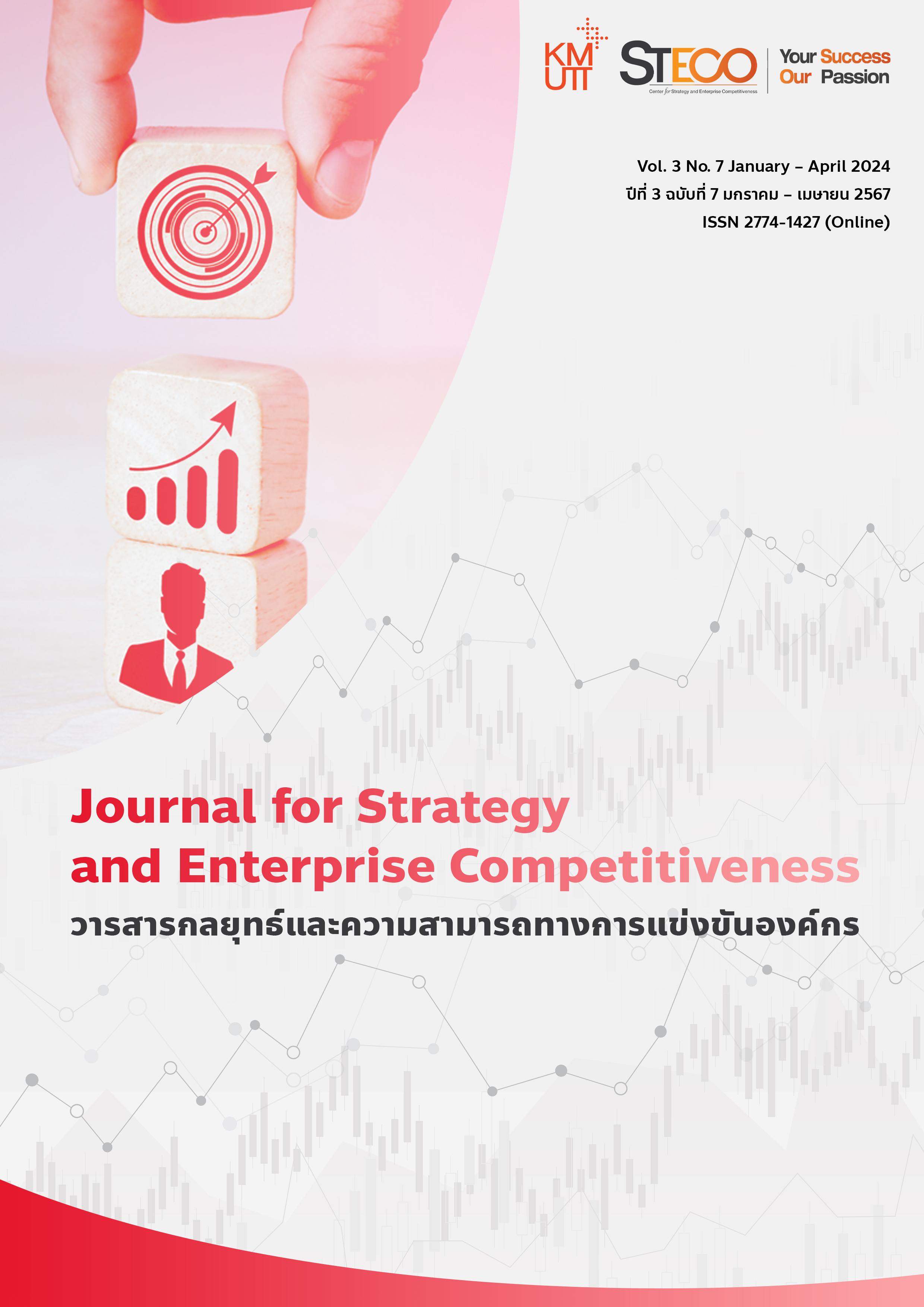Learning achievement towards teaching with simulation games in the subject of innovation and business entrepreneurship
Keywords:
learning achievement, simulation games, innovation and business entrepreneurshipAbstract
The objective of the research was to compare students' academic achievement and satisfaction with teaching using simulation games and lectures in the subjects of innovation and business entrepreneurship. It is research in a laboratory with a predetermined experimenter. The sample group was second-year students in the Faculty of Management Science, Management major. The sample consisted of 15 control groups and 15 experimental groups, with one group learning in lectures and the other group using simulation games. Data were analyzed using descriptive statistics, including mean and standard deviation, and inferential statistics, including comparing means (Paired t-test) and comparing the differences between the two groups (Independent Sample t-test).
The results of the research found that using simulation games in teaching innovation and business entrepreneurship subjects helped students have better learning achievement than lectures at the significance level of 0.05, and the students were satisfied with the teaching by simulation games rather than lectures.
References
Am, J. B., Furstenthal, L., Jorge, F., and Roth, E. (2020). Innovation in a crisis: Why it is more critical than ever. New Jersey: McKinsey & Company.
Chavalit, T. (2023). Development of academic achievement in the Thai language subject on nouns of 4 grade students using game-based learning. Khon Kaen Innovation For Thai Education.
Chincharoen, P. (2021). Development of board game-based learning activity for ecoliteracy promotion in grade 10th students. Master Degree of Education, Science Education, Naresuan University.
Chuayprakong, C. (2022). The development problem solving by using the game based learning (GBL) on money policy and fiscal policy for high school 6 students at Dongtanwittaya school. Master Degree of Education, Graduate school, Mahachulalongkornrajavidyalaya University.
Daoruang, R. (2023). PRA-TO to innovation. Proceedings of the 6th KRU National Academic Conference 2023, 8 September 2023, Thailand, 194-208. Kanchanaburi: Kanchanaburi Rajabhat University.
Daoruang, R., and Sapsanguanboon, W. (2023). The Study of Entrepreneurial Leadership Characteristics and Creative Innovation Factors Affecting Competitive Advantage of Small and Medium Enterprises in Kanchanaburi. NIDA Business Journal, 30, 105-122.
Dogani, B. (2023). Active learning and effective teaching strategies. International Journal of Advanced Natural Sciences and Engineering Researches, 7(4), 136-142.
Evan, W. (1966). Organization Lag. Human Organization, 25(1), 51-53. https://doi.org/10.17730/humo.25.1.v7354t3822136580
Fisher, K. (2010). Technology-Enabled Active Learning Environments: An Appraisal. CELE Exchange, Centre for Effective Learning Environments, 2010(7), 1-9. https://doi.org/10.1787/5kmbjxzrmc0p-en.
Gibson, D., Aldrich, C., and Prensky, M. (2007). Games and Simulations in Online Learning: Research and development Frameworks. Hershey: Information Science Publishing.
Hasso Plattner. (2010). An introduction to design thinking process guide. Institute of design at Stanford. Retrieved from https://web.stanford.edu/~mshanks/MichaelShanks/files/509554.pdf
Keeley, L., Pikkel, R., Quinn, B., and Walters, H. (2013). Ten Types of Innovation: The discipline of building breakthroughs. New Jersey: John Wiley & Sons, Inc.
Kunpol, S. (2023). Game based learning to development of achievement in mathematics learning of mathayomsuksa 1 students. MBU Education Journal, Faculty of Education Mahamakut Buddhist University, 11(2), 247-259.
Lehtonen, J. M., and Haho, T. L. P. (2003). Experimental learning through a simulation game in teaching of production management. In International Workshop of the IFIP WG 5.7: Experimental Interactive Learning in Industrial Management 22-24 May, 2003, Denmark, 63-74. Aalborg: Center for Industrial Production, University of Aalborg.
Masahiro, N. (2007). Teaching Materials Using Board Game and Classifying Table for Helping Understand Binomial Distribution. International Statistical Institute, 56th Session.
Maslow, A. H. (1987). Motivation and personality (3rd Edition). New York: Harper & Row Publishers.
National Innovation Agency. (2005). Thai Innovation. Retrieved from https://www.nia.or.th/%E0%B9%80%E0%B8%9B%E0%B8%B4%E0%B8%94%E0%B9%82%E0%B8%A5%E0%B8%81%E0%B8%99%E0%B8%A7%E0%B8%B1%E0%B8%95%E0
Prasan, S., Hengpraprom, S., Buathong, N., and Rattananupong, T. (2017). Prevalence of nomophobia among Thai undergraduate students using smartphones in public university. Chulalongkorn Medical Journal, 61(2), 248-259. https://doi.org/10.58837/CHULA.CMJ.61.2.9
Prensky, M. (2003). Digital game-based learning. Computers in entertainment (CIE), 1(1), 21-21.
Raj, R., Donald, C., Patil, A., M. Y., M., and P., S. (2022). The Game of Game-Based Learning. In C. Lane (Ed.), Handbook of Research on Acquiring 21st Century Literacy Skills Through Game-Based Learning (pp. 1-12). IGI Global. https://doi.org/10.4018/978-1-7998-7271-9.ch001
Royal Society. (2013). Royal Institute Dictionary B.E 2554. Bangkok: Nanmeebooks Co., Ltd.
Ruenrom, G. (2015). Marketing Research. (8th Edition). Bangkok: CU Press.

Downloads
Published
How to Cite
Issue
Section
License
Copyright (c) 2024 Journal for Strategy and Enterprise Competitiveness

This work is licensed under a Creative Commons Attribution-NonCommercial-NoDerivatives 4.0 International License.
The opinions appearing in the content of articles of Journal for strategy and enterprise competitiveness. It is the opinion and responsibility of the article author. It is not the opinion and responsibility of the Center for strategy and enterprise competitiveness, King Mongkut's University of Technology Thonburi
Articles, information, content and images, etc., in the Journal for strategy and enterprise competitiveness. It is the exclusive copyright of the Center for strategy and enterprise competitiveness, King Mongkut's University of Technology Thonburi. If an individual or entity wants to distribute all or part of the content or for any action must obtain written permission from the Center for Strategy and enterprise Competitiveness, King Mongkut's University of Technology Thonburi.


